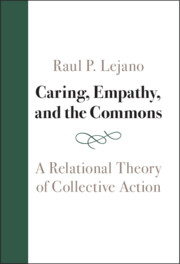
-
Select format
-
- Publisher:
- Cambridge University Press
- Publication date:
- 17 August 2023
- 31 August 2023
- ISBN:
- 9781009003353
- 9781316518779
- Dimensions:
- (229 x 152 mm)
- Weight & Pages:
- 0.41kg, 178 Pages
- Dimensions:
- Weight & Pages:
You may already have access via personal or institutional login
Book description
People are not autonomous individuals but connected beings. Curae ergo sum – we care, therefore we are. Relationality – which refers to the ethic and manner by which relational considerations govern decisions and institutional arrangements can take advantage of the power of connection – uncovers how social connection, across divides, moves people to act for the other. Drawing from research on empathy, social networks, and determinants of pro-social behavior, Caring, Empathy, and the Commons builds on Ostrom's Governing the Commons. It offers a different mechanism by which collective action is induced, arguing that, sometimes, the individual thinks not in terms of individual gain but in terms of the other. Developing this concept of relationality, this book explores various strands of literature and examines how this idea might be used to foster collective action around climate, species protection, fair trade, and other dilemmas of the commons.
Contents
Metrics
Altmetric attention score
Full text views
Full text views help Loading metrics...
Loading metrics...
* Views captured on Cambridge Core between #date#. This data will be updated every 24 hours.
Usage data cannot currently be displayed.
Accessibility standard: Unknown
Why this information is here
This section outlines the accessibility features of this content - including support for screen readers, full keyboard navigation and high-contrast display options. This may not be relevant for you.
Accessibility Information
Accessibility compliance for the PDF of this book is currently unknown and may be updated in the future.


